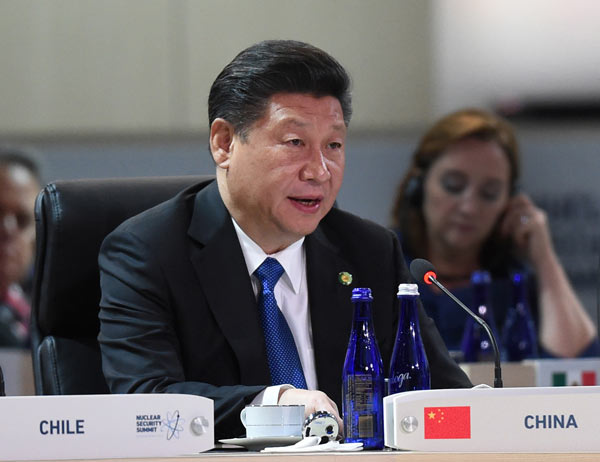A matter of nuclear responsibility
Updated: 2016-04-09 09:11
By Shen Dingli(China Daily)
|
|||||||||
 |
|
President Xi Jinping delivers a speech at the opening plenary of the fourth Nuclear Security Summit (NSS) in Washington DC, the United States, on April 1, 2016. Provided to China Daily |
President Xi Jinping's recent visit to the Czech Republic and participation in the fourth Nuclear Security Summit in Washington once again highlighted China's sense of principle and responsibility.
Czech President Milos Zeman was among the Central European leaders who attended China's military parade on Sept 3, 2015, to commemorate the 70th anniversary of the victory of the war against fascism and Japanese aggression. About 50 heads of state and international organizations graced the occasion, although unfortunately many countries, led by the world's superpower, skipped the event.
To the credit of the Czech Republic, it has also retained its independent foreign policy in spite of its new identity as a NATO member. Besides, Prague acknowledges Beijing's role in defeating the fascists in the Far East.
Prague's insistence on following an independent foreign policy has earned it the respect of Beijing, and Xi's visit to the Czech Republic despite his tight diplomatic schedule shows that.
The two sides' shared values of fighting fascism and the importance they attach to economic cooperation have helped strengthen mutual trust and strategic partnership. In fact, China has been able to deepen ties with many countries over the past decades, because it promotes mutually beneficial partnerships and offers public goods - and a strategic partnership with tangible benefits and shared values lasts long. That's why the deepening China-Czech partnership, based on the principle of mutual respect, bodes well for both sides in the long run.
As for Xi's participation in the fourth Nuclear Security Summit, it reflects another principle dear to China: multilateralism in global security affairs. Not all nuclear stakeholders attended the summit because of their difficult relations with the United States. To some extent, China too has its complaints against the US for recently selling weapons to Taiwan and sending its warships and warplanes close to China's isles in the South China Sea under the pretext of "freedom of navigation operations".
Related Stories
China ready for nuclear power cooperation: premier 2016-04-06 19:58
Nuclear energy vital for China: experts 2016-04-06 11:20
China shows a major country's responsibility of global nuclear security governance 2016-04-03 19:43
President Xi's proposals show resolve in nuclear security: experts 2016-04-03 19:22
Today's Top News
Inspectors to cover all of military
Britons embrace 'Super Thursday' elections
Campaign spreads Chinese cooking in the UK
Trump to aim all guns at Hillary Clinton
Labour set to take London after bitter campaign
Labour candidate favourite for London mayor
Fossil footprints bring dinosaurs to life
Buffett optimistic on China's economic transition
Hot Topics
Lunar probe , China growth forecasts, Emission rules get tougher, China seen through 'colored lens', International board,
Editor's Picks

|

|

|

|

|

|







